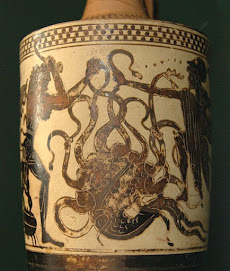All of His Labors were terrifying and near impossible, but one that seems to be remembered easily by most people is that of the Hydra. I have said in the past that monsters are still monsters even if we've grown used to their presence and call them by different names than in times of old. In fact, a monster is simply defined as an animal of great size or ugliness that incites fear and panic into people. So in search of the truths behind ancient Greek stories, I began to study the second Labor of Herakles in a bit more detail, and what I found piqued my interest greater than ever. But before I begin, let me briefly describe this Labor in order to familiarize the reader.
The monster was more specifically called the Lernaean Hydra, after the coastal springs and fresh lake area that formed the waters, known as Lerna Lake. Today, the water source is extinct. It sits right near the ocean shores east of Arkadia. The monster that lived there was said to have nine or ten heads, depending on the source, and that each time one was cut off, more would regrow. Not only was the beast of immense size and power, it possessed deadly and poisonous breath and blood. Herakles managed to defeat the creature by cutting off eight heads and burying the ninth under a rock.
In the picture above, we see an ancient depiction of Herakles fighting the Hydra. We may not think at first glance that the Hydra looks a lot like an octopus. Octopuses have eight arms and one head, making nine ends, and if they lose an arm, it can regenerate the lost limb in pristine condition. The arms even have their own minds. The animals can also grow to immense size and possess incredible strength. They also carry very painful and deadly venom that can be inflicted upon prey or opponents. Is it possible that the Hydra was exactly this, and that Herakles managed to kill after it had haunted the inhabitants of the area with deadly attacks and/or harassment? They can most certainly kill a human very easily with their poison, and depending on size, might even be able to drown a victim. I think the evidence all points to a very menacing, multi-limbed water monster that we today call the octopus, and to take out one of this magnitude on its own turf with bear hands and sword, would be something most definitely unique and Heroic. The only setback is the fact that the Lake was a freshwater source, and these animals cannot live in that. But who knows? In ancient times, there might have been a part that flowed into it from the sea, or perhaps the inhabitants just thought that the creature came from the Lake but didn't always live there. Maybe the actual battle took place in the sea.
Assuming I am correct, these monsters still live with us today in abundant numbers. The hydras have even become a favorite meal, interestingly, in the Mediterranean, and far East. But generally, they are simply beautiful and fascinating creatures to watch and study. They've even been known to create their own communities. They are very intelligent and resourceful, and have been here for nearly 300 million years, which predates modern humans by a long shot. If only they had been able to talk and take notes, what a world of fascination they could reveal to us.
So the next time you take a dip at the beach, don't forget that the Hydra may still be watching, and in the case that you encounter one, it's probably not a good idea to try to be another Herakles if you can avoid it. There was only one.
In the Goodness of the Gods,
Chris Aldridge.
